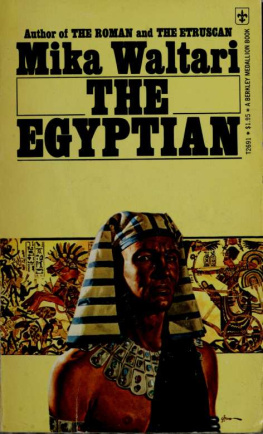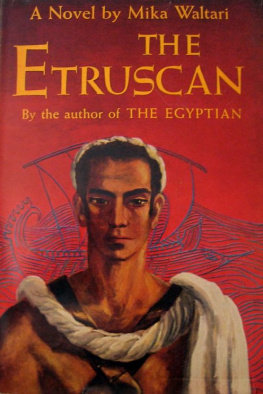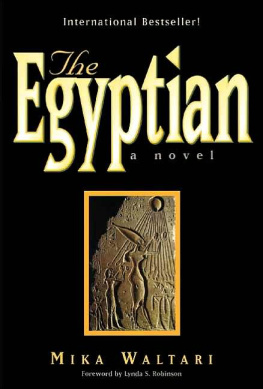Mika Toimi Waltari - The Roman
Here you can read online Mika Toimi Waltari - The Roman full text of the book (entire story) in english for free. Download pdf and epub, get meaning, cover and reviews about this ebook. year: 1994, publisher: Buccaneer Books, genre: Home and family. Description of the work, (preface) as well as reviews are available. Best literature library LitArk.com created for fans of good reading and offers a wide selection of genres:
Romance novel
Science fiction
Adventure
Detective
Science
History
Home and family
Prose
Art
Politics
Computer
Non-fiction
Religion
Business
Children
Humor
Choose a favorite category and find really read worthwhile books. Enjoy immersion in the world of imagination, feel the emotions of the characters or learn something new for yourself, make an fascinating discovery.
- Book:The Roman
- Author:
- Publisher:Buccaneer Books
- Genre:
- Year:1994
- Rating:4 / 5
- Favourites:Add to favourites
- Your mark:
- 80
- 1
- 2
- 3
- 4
- 5
The Roman: summary, description and annotation
We offer to read an annotation, description, summary or preface (depends on what the author of the book "The Roman" wrote himself). If you haven't found the necessary information about the book — write in the comments, we will try to find it.
The Roman — read online for free the complete book (whole text) full work
Below is the text of the book, divided by pages. System saving the place of the last page read, allows you to conveniently read the book "The Roman" online for free, without having to search again every time where you left off. Put a bookmark, and you can go to the page where you finished reading at any time.
Font size:
Interval:
Bookmark:
THE ROMAN
The memoirs of Minutus Lausus Manilianus, who has won the Insignia of a Triumph, who has the rank of Consul, who is Chairman of the Priests Collegium of the god Vespasian and a member of the Roman Senate by MIKA WALTARI
CONTENTS
PART ONEMINUTUS
Book Page 1 Antioch 14 2Rome 46 3Britain 130 4 Claudia 168 5 Corinth 206 6Sabina 254 7Agrippina296
PART TWOJULIUS, MY SON
8Poppaea 350 9Tigellinus 398 10 The Witnesses 450 11 Antonia 488 12 The Informer 524 13 Nero560 14Vespasian604 Epilogue 637
THE JULIAM HOUSE JULIUS CAESAR MARCIA JULIUS CAELSAR JULIAATIUS SALBUS ATIA C OCTAVIUS OCTAVIA AUGUSTA L C MARCELLUS 2. MARCUS ANTONIUS AUCUSTUS ESCRIBONIA 2. LIVIA (MOTHER OF TIBERIUS) ANRONIAMAJOR DOMITIUS AKENOBARBUS ANTONIA MINOR= DRUSUS MAJOR JULIAA I. MARCELLUS 2.AGRIPPA .TIBERLUS I I DOMITIA LEPIDABARBERTUS DOMITIUS GERMANICUS CLAUDIUS I URGURANILLA 3. MESSALINA AGRIPPINA CERMANICUS 2. AELIA 4. AGRIPPINA I I MESSALINA CLAUDIUIS ANTONIA ACRIPPINA=I.DOMITIUS 2.CLAUDIUS C CALIGULA OCTAVIA NERO- BRITANHTCUS LUCIUS DOMITIUS NERO I. OCTAVIA 2. POPPAEA CLAUDIA AUGUSTA
PART ONE MINUTUS
Suetonius, The Twelve Caesars, Claudius (25).
Because the Jews at Rome caused disturbances at the instigation of Christus [Claudius) banished them.
Aurelius Victor, De Caesoribus (5)
Although he held power for the same number of years as his stepfather, and for much of that time as a very young man, yet for the first five years he was so great, particularly in his development of the city, that Trajan used often to assert, and rightly, that none of the emperors came anywhere near matching those five years of Nero.
BOOK 1
Antioch
I WAS seven years old when the veteran Barbus saved my life. I remember well how I tricked my old nurse Sophronia into letting me go down to the banks of the river Orontes. The rapid swirling current attracted me and I leaned over the jetty to look at the bubbling water. Then Barbus approached me and asked in a friendly way: Do you want to learn to swim, boy? I replied that I did. He looked around, and grasping me by the back of my neck and the crotch, he flung me far out into the river. Then he let out a wild cry, calling on Hercules and the Roman Jupiter the Conqueror, and flinging his ragged cloak down on the jetty, he plunged into the water after me. People flocked to his cry. They all saw and unanimously testified to how Barbus, at the risk of his own life, saved me from drowning, carried me ashore, and rolled me on the ground to make me spew up the water I had swallowed. When Sophronia arrived, crying and tearing her hair, Barbus lifted me in his strong arms and carried me all the way home, although I struggled to get away from his filthy clothes and the smell of wine on his breath. My father was not particularly fond of me, but he plied Barbus with wine and accepted his explanation that I had slipped and fallen into the water. I did not contradict Barbus, for I was used to holding my tongue in my fathers presence. On the contrary, I listened as if spellbound as Barbus modestly related how, during his time as a legionary, he had swum fully equipped across the Danube, the Rhine and even the Euphrates. My father drank wine, too, to calm his fears, and was himself disposed to relate how, as a youth at the school of philosophy in Rhodes, he had wagered that he could swim from Rhodes to the mainland. He and Barbus were in complete agreement that it was high time I
learned to swim, My father gave Barbus some new clothes so that when he was dressing, Barbus had an opportunity to exhibit his many scars. From that time onwards Barbus stayed at our house and called my father master. He escorted me to school, and when he was not too drunk, came to fetch me at the end of the school day. First and foremost, he raised me as a Roman, for he really had been born and bred in Rome and had served for thirty years in the 15th legion. My father was careful to confirm this, for although he was an absentminded and reserved man, he was not stupid and would never have employed a deserter in his house. Thanks to Barbus, I learned not only to swim but also to ride. At his request my father bought me a horse of my own so that I could become a member of the young Equestrian Knights in Antioch as soon as I was fourteen. It was true that Emperor Gaius Caligula had struck my fathers name from the rolls of the Roman Noble Order of Equestrian Knights with his own hand, but in Antioch that was considered more of an honor than a disgrace since everyone remembered only too well what a good-for-nothing Caligula had been, even as a youth. Later he was murdered at the great circus in Rome as he was about to promote his favorite horse to the rank of Senator. At the time, my father, albeit reluctantly, had reached such a position in Antioch that they wanted him to go with the delegation the city was sending to Rome to congratulate Emperor Claudius on his accession. His knighthood would undoubtedly have been returned to him there, but my father resolutely refused to go to Rome, and later it was proved that he had had good reasons for this. Now he himself said that he preferred to live in peace and humility and that he had no desire for a knighthood. Just as Barbus had come to our house by chance, so also had my fathers fortune increased. He used to say in his bitter way that he had had no luck in his life, for when I was born, he lost the only woman he had ever really loved. But even in Damascus he had already made a habit of going to the market on the anniversary of my mothers death and buying a wretched slave or two. Then when my father had kept the slave for a time and fed him well, he took him to the authorities, paid the redemption fee and gave the slave his freedom. He allowed these freedmen to
use the name Marcius, not Manlianus, and gave them money so that they could begin to practice the trade they had learned. One of his freedmen became Marcius the silk merchant, another Marcius the fisherman, while Marcius the barber earned a fortune modernizing womens wigs. But the one who became the wealthiest of all was Marcius the mine owner, who later made my father buy a copper mine in Sicily. My father also frequently complained that he could never carry out the smallest charitable deed without receiving benefit or praise from it. Since he had settled in Antioch, after his seven years in Damascus, he had served, good linguist and moderate that he was, as adviser to the Proconsul, especially on matters concerning Jewish affairs, in which he had become thoroughly versed during earlier travels in Judaea and Galilee. He was a mild and good- natured man and always recommended a compromise in preference to forceful measures. In this way he won the appreciation of the citizens of Antioch. After losing his knighthood, he was elected to the city council, not just for his strength of will and energy, but because each party thought he would be useful to them. When Caligula demanded that an idol of himself should be raised in the temple in Jerusalem and in all the synagogues in the province, my father realized that such an act would lead to armed uprising, and he advised the Jews to try to gain time rather than make unnecessary protests. So it came about that the Jews in Antioch let the Roman Senate think that they themselves wanted to pay for sufficiently worthy statues of the Emperor Gaius in their synagogues. But the statues suffered several misfortunes during their manufacture, or else the premonitory omens were unfavorable and prevented their erection. When Emperor Gaius was murdered, my father won much approval for his foresight. Though I do not believe he could have known anything about the murder beforehand but had merely wished, as usual, to gain time and avoid trouble with the Jews, which would have upset trade in the city. But my father could also be stubborn. As a member of the city council, he flatly refused to pay for circus shows of wild animals and gladiators and was even against theatrical performances. On the advice of his freedmen, however, he had an arcade
Next pageFont size:
Interval:
Bookmark:
Similar books «The Roman»
Look at similar books to The Roman. We have selected literature similar in name and meaning in the hope of providing readers with more options to find new, interesting, not yet read works.
Discussion, reviews of the book The Roman and just readers' own opinions. Leave your comments, write what you think about the work, its meaning or the main characters. Specify what exactly you liked and what you didn't like, and why you think so.












